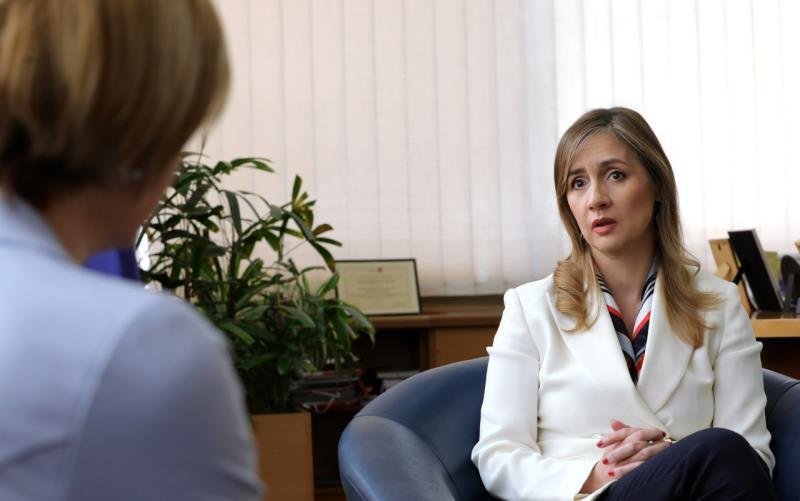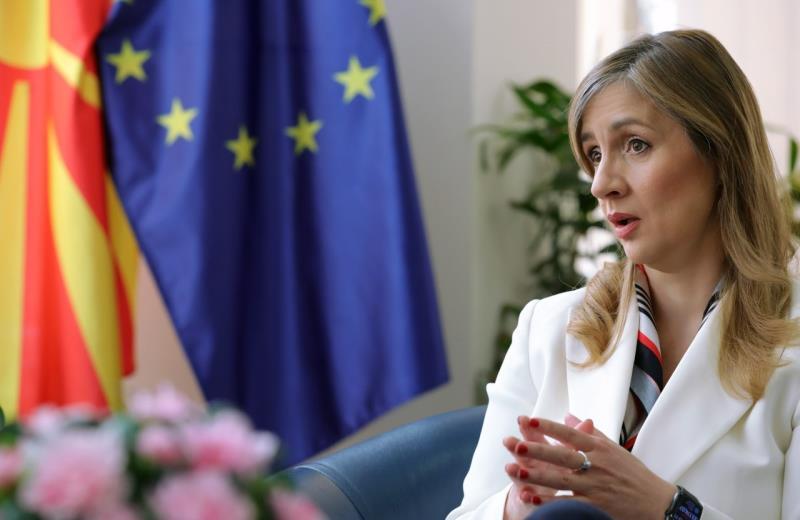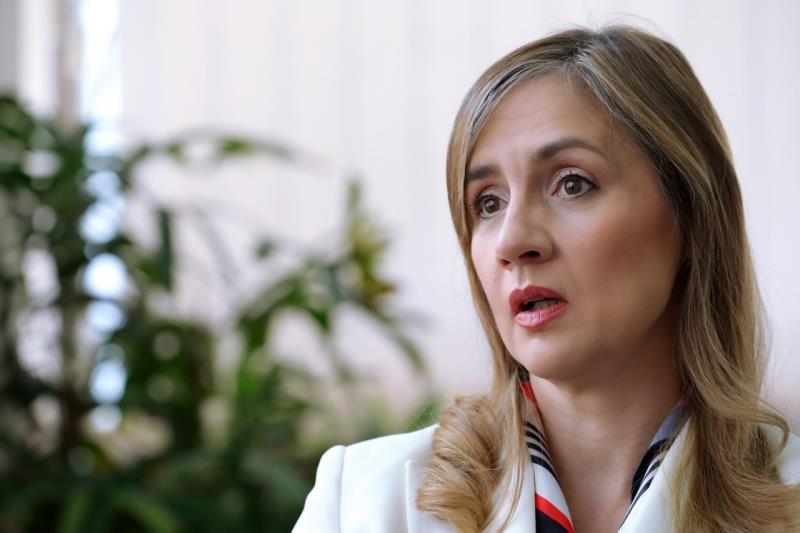Skopje, 13 March 2022 (MIA)
Тhe National Bank stands responsibly by the fact that the denar has been and will remain stable. There is no reason for changing the exchange rate, it will not be beneficial to anyone, says Governor Anita Angelovska Bezhoska in the interview with MIA.
She points out that the National Bank has the capacity and set of instruments to defend the denar exchange rate, if necessary, which is also indicated in the past almost three decades, when the stability of the domestic currency was successfully maintained during many crises. Foreign reserves are high and amount to Euro 3.4 billion, which is as twice as high as in 2008 - the year of global financial crisis when the denar stability was successfully maintained.
Regarding the information that there are no foreign currencies on the market, the Governor says that it is not true and she appeals to the citizens not to give in to such speculations.
- I must address this issue, because these speculations cause material damage to the citizens. We witness that when one speaks of crisis, some of the citizens still resort to changing their savings into foreign currency or to purchasing foreign currency cash. In addition, there are also speculations that there are no foreign currencies on the market, which is absolutely not true. In this way, an unfounded panic is made, and the citizens, based on speculations, also pay a higher price for changing the currencies and lose funds, the Governor says.
In her interview, the Governor also reveals whether there will be double-digit inflation and whether the National Bank designs measures similar to those applied during the health crisis when there was a temporary delay in the credit liabilities of citizens and companies.

Governor, it is obvious that the Russian-Ukrainian crisis affects the economy. Although there are no direct consequences on our economy, however the growth of food and energy prices on world markets is also felt in our country. Consumer prices are growing every day. The forecasts of some experts are that double-digit inflation awaits us. To what extent are these expectations realistic?
- It is true that the direct exposure of our economy to the Russian and Ukrainian economy is small, but even at the beginning, before the escalation of the conflict, we pointed out that indirect effects are expected through energy and food prices and through reduced growth of the European economy. This comes from the fact that our economy is open to the European economy (77 percents of our export is to the EU), and the European economy is exposed to the Russian and Ukrainian economy. The exposure is especially high to Russia through the energy imports, given that Russia is the main supplier of the EU with crude oil, natural gas and solid fossil fuels. Hence, the main risks to the European, and accordingly, our economy, are higher inflation and lower economic growth. Actually, the higher inflation is expected to stop the trend of the gradual recovery of private consumption which will adversely affect the growth.
This is also indicated by the latest forecasts of the European Central Bank (ECB), published on Thursday. According to the ECB, the inflation forecast in the euro area has been revised upwards and it is expected to be 5.1 percents for this year, and then it is expected to decrease to the level of 2 percents, targeted by the central bank. Moreover, in certain scenarios it can also reach up to 7.1 percents for this year. On the other hand, the forecast for the growth of the euro area has been revised downwards. In this context, the ECB has not yet tightened the monetary policy, i.e. has not decided to raise the interest rates, and continued to inject liquidity into the economy, although at a slightly slower pace than previously expected.
In terms of inflation in our country, there are upward price movements - a phenomenon present in all countries at the moment. This phenomenon is mainly a reflection of growth of the world prices of primary products (food and energy), but also growth of the import prices of other products in general. This is particularly evident in economies that are import dependent, i.e. where a significant part of consumption is imported, as is our economy. Actually, we are the most open trade economy in the region of the Western Balkans, and in the region of Central Southeast Europe we are fifth in openness.
The latest ECB forecasts for the inflation in the EU, as our major import partner, as well as the upward revisions of the world energy and food prices point to higher inflation also in our country this year, and then gradual reduction next year. However, we should also take into account that the smaller economic growth will also mean smaller demand for goods and services.
Hence, the assumptions are changing, there are several factors that can affect inflation in the next period, and what their impact will be depends a lot on the further development of the crisis, intensity, duration, new sanctions etc. Also, the undertaken fiscal measures should mitigate the short-term effects.
If there are more pronounced pressures from the demand, there should be no dilemma that the National Bank will respond in a timely manner with the set of instruments it has at its disposal. We are monitoring the internal and external developments on a daily basis. The monetary policy setup is fully re-examined at least once a month. The international financial institutions assess that the National Bank conducts an appropriate monetary policy.
In short, everything that needs to be done - we do. We are making maximum efforts to maintain the macroeconomic stability, and simultaneously contributing to favorable interest rates for citizens and companies, i.e. for the economy.

Russia’s invasion in Ukraine caused a scare with the people of devaluation of the denar. As a central bank, you have given information that the denar is stable. Can the central bank, with all instruments it has at its disposal, guarantee that the national currency will remain stable?
- Categorically, with the entire responsibility, the National Bank stands by the fact that the denar is stable and will remain stable. There is no reason for changing the exchange rate, it will not be beneficial to anyone.
We have the capacity and set of instruments to defend the exchange rate of the denar, if necessary. The past almost three decades speak about the capacity, when the stability of the domestic currency was successfully maintained through many crises. Regarding the instruments, although we have several instruments at our disposal, I will emphasize the most important one - the foreign reserves, which are high, Euro 3.4 billion, or at a twice higher level compared to 2008, a crisis year, a year of global financial crisis, when we also successfully maintained the stability of the denar. In its latest report on the country, published last month, the IMF also points out that the level of foreign reserves is appropriate to the exchange rate policy we apply. In the report, the Fund concludes that the exchange rate level is fully compatible with the economic circumstances and policies and there is absolutely no need for any change.
Additionally, the central bank has access to a special repo line, i.e. additional foreign currency liquidity in the amount of euro 400 million, provided by the European Central Bank in 2020. This means that the National Bank has additional space for fast and efficient action in case of a need to mitigate possible effects on the domestic economy and financial markets, given the uncertainty surrounding the current global economic and geopolitical crisis.
The speculations regarding the demand for foreign currency, euros in particular, have become frequent on the domestic market nowadays. I have to address this issue, since these speculations are really causing material damage to the citizens. We are witnessing that, in times of crisis, some citizens are still resorting to converting their savings into foreign currency or buying cash foreign currency. Moreover, there are speculations that there is no foreign exchange on the market, which is absolutely not true. This way, an unfounded panic arises among citizens, and on the basis of these speculations, they pay higher prices for currency exchange and lose funds.
Consequently, I would like to point out again, the National Bank remains committed to maintaining the stability of the domestic currency and has sufficient funds to provide foreign currency liquidity.

Given the new situation, can we expect for the Macedonian economy to reach the forecasts for growth or the National Bank will come out with their correction?
– We ended the last year with a growth which was almost in line with our latest forecasts, which predicted a growth of 3.9% for both, last previous and this year. However, those forecasts did not take into account recent developments in Ukraine, which are causing turmoil in global markets. The escalation of the situation exacerbates the previously existing problems caused by the slow supply chains, while we are all witnessing the volatility it causes in the prices of energy, food and other resources. Both, upward and downward daily oscillations are extremely large. This shows that at the moment we are really facing volatility and unpredictability, which makes forecasting difficult. In such circumstances, the expectations of the entities change, and the restraint on consumption and investments may increase.
Hence, the risks to economic growth are downward, and the extent to which the impact of all these factors will be pronounced will depend, among other things, on further developments in Ukraine, which are currently very uncertain.
The developments and prospects of the EU, as our most important trading partner, are an important factor to us, and the growth of import prices as well, in accordance with their impact on foreign and domestic demand. According to the latest ECB estimates, the outlook for economic growth in euro area has deteriorated, as a result of the effects of developments in Ukraine on energy prices, trust and trade, due to which the economic growth forecasts have been revised downward for 2022 (by 0.5 percentage points) and minimally for 2023. The ECB based these expectations on the assumption that current disruptions in energy supply and the adverse effects on trust due to military developments are temporary, with no serious impact on global supply chains. Given the high uncertainty from military developments, there are two alternative scenarios-unfavorable one, in case of tougher sanctions against Russia, which would affect the global supply chains, and second, extreme scenario, in case of a more pronounced reduction of energy supply, and thus a stronger reaction on energy prices and financial markets and more pronounced transmitted price effects- according to which, growth in 2022 would be lower, in the range of 1.2 to 1.4 percentage points in relation to the baseline scenario.
The spring macroeconomic forecasts are underway, within which the new information and risks will be reviewed in details, after which the National Bank will come up with new insights into the forthcoming period.

The banking sector proved to be resilient in the period of the health crisis and showed stability even in times of crisis. You are confident that it is still stable and ready to respond to the challenges arising from the Russian-Ukrainian conflict. How powerful are the domestic banks in such complex conditions to meet the needs of companies and citizens?
– As you have stated in the question, the banking system, as many times before, has confirmed its resilience to shocks and has successfully dealt with challenges of the health crisis. Moreover, what is of utmost importance and what I would like to emphasize is that the banking sector managed to provide solid credit support to the real sector throughout this period, which is a significant impetus to the economic recovery. It is through this channel that the relaxed monetary policy has contributed and continues to contribute to the support of the private sector in times of crisis.
These were our assessments and expectations from the very beginning of the pandemic and our positions have not changed. They are based on several indicators for the banking sector, which are regularly monitored in the National Bank, some of which on a daily basis. They show that the protective capacities of the domestic banking sector have not only been maintained, but also additionally strengthened during this period. The system has an appropriate level of capitalization, with capital adequacy ratio of 17.3%, which is higher compared to the period before the corona crisis. The traditionally high liquidity, which is a feature of the domestic banking sector, is also maintained at a solid level. The loan portfolio is healthy with a rate of non-performing loans of 3.3% registering an improvement compared to the pre-pandemic period. Since the beginning of this year, the lending continues to grow and in January it was 8.6%, with loans to both household and corporate sector. This is supported by the further growth of deposits, which are higher by 8.5% as of January.
We do not expect a significant direct impact on the domestic banking sector by the developments in Ukraine, due to its very weak financial ties with Russia and Ukraine. The lack of capital from these two countries in the domestic banking sector is an additional factor. The regular stress tests also show that the banking system as a whole is resistant to possible shocks. These are all facts that speak for the health and stability of the domestic banking sector. This is not only our assessment, but it is also noted in the reports of the international institutions. So, let me summarize the answer to your question –yes, the domestic banking system has the capacity to respond to the needs of citizens and companies even in complex conditions, which was best confirmed during the pandemic. The latest data show that it is ready to face risks, if they appear, and has the capacity to support the economy.

If the crisis deepens, are there possibilities for the banking sector to temporarily delay the loan liabilities of citizens and companies, following the example of such a measure at the beginning of the health crisis?
– Regulatory easing for temporary delayed loan liabilities were introduced in response to the specific pandemic shock to mitigate the liquidity pressures on the private sector, which were severely pronounced at the time and could spill over into solvency, by permanently disrupting the creditworthiness of many clients. This also protected the banks’ balance sheets from possible excessive accumulation of bad loans in a short period of time, which would limit the lending activity. Observed from today’s perspective, the measures have yielded results by easing the financial burden on the population and the corporate sector. Almost two years after the introduction of this measure, the banks’ loan portfolio is of good quality.
I would like to mention that even without the regulatory relief and in accordance with the existing regulations, the banks have the opportunity to restructure the receivables i.e. to change the contractual terms of the loan or to approve new credit exposure to close the existing one, to a client with deteriorated financial condition or there are signals that his financial situation will be deteriorated, due to which he cannot or could not comply with the agreed conditions. This is a regular opportunity, in accordance with international and European standards incorporated in domestic regulations.
As a central bank, we will certainly continue to monitor the developments and respond appropriately if needed, using measures that will adequately respond to the overall situation, with the priority of maintaining macroeconomic and financial stability, which is the essence of the National Bank’s operation.
(MIA)
Biljana Anastasova-Kostikj
foto: Frosina Naskovikj